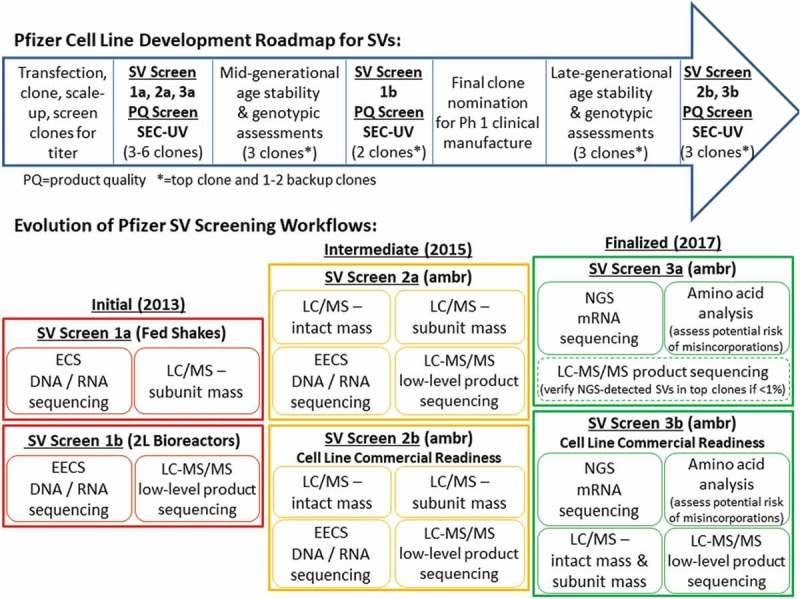Creative Proteomics provides protein sequence variant analysis service to help global clients gain a deeper understanding of protein function and biological processes, and explore their potential for application in disease prevention and treatment, as well as help them meet the ICH Q6B guideline requirements.
What is Protein Sequence Variant?
Protein sequence variants (SV) refer to variations in the amino acid sequence of a protein, which may result from mutations or other genetic changes. These sequence variants can lead to changes in the structure, function, stability, or other properties of the protein.
 Fig 1. The evolution of both genetic and analytical SV screening approaches at Pfizer that occurred over the course of ~ 6 years. (Lin, T. J., et al.; 2019)
Fig 1. The evolution of both genetic and analytical SV screening approaches at Pfizer that occurred over the course of ~ 6 years. (Lin, T. J., et al.; 2019)
Sequence variants in proteins are important for understanding disease pathogenesis and drug development. Some sequence variants may cause disease by affecting protein function, while others may serve as targets for drug development. By studying protein sequence variants, researchers can better understand their role in health and disease, and develop targeted treatment strategies.
Protein Sequence Variant Analysis Technologies
Mass Spectrometry
Protein sequence variants can be found and described using the potent technique of mass spectrometry. It entails ionizing the protein and assessing the resultant ions' mass-to-charge ratio. Variations in protein sequences can be found by contrasting the mass spectra of several samples.
Next-Generation Sequencing
In order to identify variation at the DNA or RNA, next-generation sequencing technologies enable quick, high-throughput sequencing of the coding regions of DNA or RNA genes. Sites of protein sequence variation can be found by comparing the coding area sequences.
Antibody-Based Methods
Protein sequence variation can be found using antibody-based techniques like Western blotting and immunohistochemistry that target certain proteins for identification. In order to recognize certain protein sequences, this technique significantly depends on the usage of antibodies.
Bioinformatics Tools
Protein sequence variation can be analyzed and found using a variety of bioinformatics methods and databases. With the help of these instruments, it is possible to compare protein sequences from various sources and spot variations like single nucleotide polymorphisms (SNPs), insertions, deletions, or post-translational modifications.
MALDI-TOF Mass Spectrometry
The mass-to-charge ratio of peptides made from proteins can be examined using MALDI-TOF mass spectrometry to find changes in protein sequence. This technique can detect post-translational modifications as well as alterations in protein sequences.
Sanger Sequencing
Sequence differences in genes that code for proteins can be found using the conventional DNA sequencing technique known as Sanger sequencing. SNPs, insertions, and deletions can all be found by sequencing the DNA of a gene of interest.
Challenges of Protein Sequence Variants Analysis
The vast amount of genomic and proteomic data available necessitates robust computational algorithms and bioinformatics tools for variant detection and annotation. Accurate variant identification and classification are crucial to differentiate disease-causing variants from benign polymorphisms.
The functional consequences of protein sequence variants can vary greatly. While some variants may have noticeable effects on protein structure and function, others may be subtle and require advanced biochemical and biophysical characterization techniques for proper evaluation.
The interpretation of sequence variants in the context of disease phenotype is complex. Variants that are benign in the general population may contribute to disease susceptibility in specific genetic backgrounds or in combination with other variants.
Our Advantages
- Customer-First
- Expertise and Experience
- State-of-the-Art Equipment
- Timely Delivery
Our Goals
The goal of Creative Proteomics is to support our clients in meeting the constantly expanding and changing need for protein sequence variations analysis. We provide a wide range of services pertaining to protein medicines, offering you top-notch answers quickly to assist you in completing your research tasks. Please get in touch with us if you are interested in our services or have any further inquiries; we welcome your feedback and look forward to working with you.
Reference
- Lin, T. J., et al.; Evolution of a comprehensive, orthogonal approach to sequence variant analysis for biotherapeutics. mAbs. 2019, 11(1): 1–12.
Related Sections
Services
Applications
For research use only, not intended for any clinical use.


 Fig 1. The evolution of both genetic and analytical SV screening approaches at Pfizer that occurred over the course of ~ 6 years. (Lin, T. J., et al.; 2019)
Fig 1. The evolution of both genetic and analytical SV screening approaches at Pfizer that occurred over the course of ~ 6 years. (Lin, T. J., et al.; 2019)








